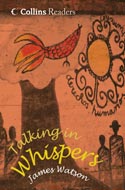I thought I could answer this one easily, especially having spent most of my teaching career with Atticus Finch and Tom Robinson, but when something really contemporary comes along it can leave you flummoxed. To what extent do you discuss scenes of torture and political corruption with a KS3 class? James Watson’s Talking in Whispers has been awarded the German Buxtehunder Bulle award for outstanding teenage fiction that deals with human rights issues, both accolades are well deserved. The novel is gripping, emotive and horrific. Set in San Jose it discusses, in graphic detail, the corruption of the Chilean government and police force. Indeed, it opens with a scene that sees a character burnt to death and another kidnapped. My question is how do we make this valuable for the classroom?
Background
Firstly, pupils need to understand the context of the novel – this may involve pupils investigating a map and researching Chile. I might also draw parallels to Syria or look at the media coverage of the Mexican student and police riots. Pupils could discuss how these cases make them feel or write extracts on their responses to articles and images.
Building an atmosphere of trust
I would be frank with the class about what is in this novel before I start. I would also make them aware of what is going to happen before key chapters are read, possibly giving them a time out clause so that if a scene is too distressing the can leave the room or focus on another activity. Asking for pupil feedback throughout – either verbally or in a private note to me – allows the pupils to feel that they are being listened to and allows the teacher to draw back if needs be or re-explain a key scene or term.
Empathy and pupil voice opportunities
Watson includes Pablo Nernda’s quote: ‘Do you want to be the lone ghost walking by the sea, blowing his pointless disheartening instrument?’ This could be used to prompt a discussion on morals and values. When is it right to stand up and be counted? I might compare key scenes to the courtroom scene in To Kill A Mockingbird or find links in poetry – the poem ‘First they came’ by Martin Niemoller is a great place to start. How do pupils respond to these ideas? What would they do if they were in Andres’ shoes? How is this corruption allowed to thrive? What parallels can they draw between these events and the events they have previously researched and studied?
Persuasive writing opportunities
This book will draw an emotive response from any reader – how do you channel that? Opportunities for charity or education leaflets and pamphlet studying could be included here. Amnesty International has fantastic class resources and ideas on their website. On that note, pupils could create their own websites for a charity or cause of their choice. Can they find any blogs from school children in Chile?
I don’t think that teachers should shy away from novels that deal with such sensitive issues; indeed I think we should embrace them. With that in mind, the following real-life-application scenario cards may help as a warm-up activity.
Download FREE Scenario cards
Jo Fliski is a teacher of English, Media and Drama at Lliswerry High School as well as being Head of PSHE. She a freelance writer and author. 



